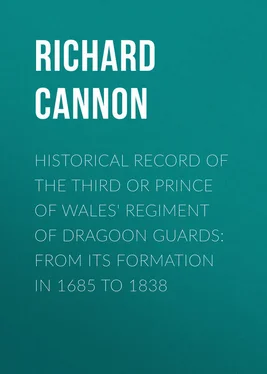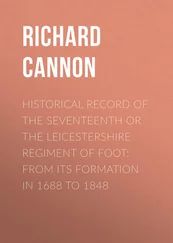Richard Cannon - Historical Record of the Third or Prince of Wales' Regiment of Dragoon Guards - From Its Formation in 1685 to 1838
Здесь есть возможность читать онлайн «Richard Cannon - Historical Record of the Third or Prince of Wales' Regiment of Dragoon Guards - From Its Formation in 1685 to 1838» — ознакомительный отрывок электронной книги совершенно бесплатно, а после прочтения отрывка купить полную версию. В некоторых случаях можно слушать аудио, скачать через торрент в формате fb2 и присутствует краткое содержание. Издательство: Иностранный паблик, Жанр: foreign_antique, foreign_prose, на английском языке. Описание произведения, (предисловие) а так же отзывы посетителей доступны на портале библиотеки ЛибКат.
- Название:Historical Record of the Third or Prince of Wales' Regiment of Dragoon Guards: From Its Formation in 1685 to 1838
- Автор:
- Издательство:Иностранный паблик
- Жанр:
- Год:неизвестен
- ISBN:нет данных
- Рейтинг книги:4 / 5. Голосов: 1
-
Избранное:Добавить в избранное
- Отзывы:
-
Ваша оценка:
- 80
- 1
- 2
- 3
- 4
- 5
Historical Record of the Third or Prince of Wales' Regiment of Dragoon Guards: From Its Formation in 1685 to 1838: краткое содержание, описание и аннотация
Предлагаем к чтению аннотацию, описание, краткое содержание или предисловие (зависит от того, что написал сам автор книги «Historical Record of the Third or Prince of Wales' Regiment of Dragoon Guards: From Its Formation in 1685 to 1838»). Если вы не нашли необходимую информацию о книге — напишите в комментариях, мы постараемся отыскать её.
Historical Record of the Third or Prince of Wales' Regiment of Dragoon Guards: From Its Formation in 1685 to 1838 — читать онлайн ознакомительный отрывок
Ниже представлен текст книги, разбитый по страницам. Система сохранения места последней прочитанной страницы, позволяет с удобством читать онлайн бесплатно книгу «Historical Record of the Third or Prince of Wales' Regiment of Dragoon Guards: From Its Formation in 1685 to 1838», без необходимости каждый раз заново искать на чём Вы остановились. Поставьте закладку, и сможете в любой момент перейти на страницу, на которой закончили чтение.
Интервал:
Закладка:
On the 3rd of November, in this year, the Earl of Plymouth died, and the Colonelcy of the Fourth Horse was given to Brigadier-General Sir John Fenwick, who had for several years held the appointment of Lieut. – Colonel of the Second Troop, now Second Regiment, of Life Guards; he was also one of the inspecting generals of cavalry, and was known to be firmly attached to the King, and a zealous supporter of the measures of the court. Several officers resigned their commissions, and they were replaced by men whose principles were presumed to be favourable to papacy and absolute monarchy.
Although the nation was at peace, and arts and manufactures were prospering, yet the minds of the people were troubled, for they saw the King proceeding with rapid progress towards effecting the overthrow of the established religion and laws of the kingdom; while the nobility appeared resolved to make a stand against the arbitrary measures of the court. Thus, the Fourth Horse, when they had been only three years in the service of the crown, found themselves in a most perplexing situation; yet their conduct was so truly honourable, that every individual who has served in the corps may reflect with exultation on the fact that, throughout the whole period of its service, its reputation has been preserved untarnished. In the summer of 1688 it again erected its tents on Hounslow Heath; and, several Bishops having been imprisoned and brought to trial for not acquiescing in the King's measures, on the day they were acquitted, his Majesty, after reviewing the army on the Heath, dined in the Earl of Feversham's tent when, on a sudden, the soldiers began to shout and huzza; the King inquired the cause of the noise, and was answered – 'Nothing, your Majesty, but the soldiers shouting because the Bishops are acquitted.' The King answered, with evident displeasure, 'Call you that nothing?' and dismissed the troops to their quarters, resolving (according to the historians of that period) never to call them together again until he had remodelled them, by the dismissal of protestants and the introduction of papists. But events were ripe for execution; and the Prince of Orange was, in compliance with the solicitations of the English nobility, preparing an expedition for England to support the established religion and laws.
When the Fourth Horse left Hounslow Heath, they proceeded into quarters at Oxford and Woodstock. In the beginning of November they marched to Alresford; and when the Prince of Orange landed at Torbay, they were ordered to advance to Salisbury, where King James's army was assembled; before leaving Alresford, the men, in consequence of an order from the Secretary-at-War, placed their ARMOUR under the charge of the civil authorities of the town, from whence it was subsequently removed to the Tower of London.
King James arrived at Salisbury to command the forces in person, where he again discovered the reluctance of the troops to support the proceedings of the jesuitical faction by which he was governed; and, alarmed by the desertions which took place, he fled to London and ultimately to France. Several corps went over to the Prince of Orange; but the Fourth Horse preserved their fidelity to King James until that unhappy monarch forsook the throne; and when the Prince assumed the reins of government, His Highness ordered the regiment to march to Dorking and Ryegate, where it received a draught of 100 men and horses from the Marquis de Miremont's 11 11 The Marquis de Miremont was a French nobleman, and cousin to Louis Earl of Feversham.
regiment of horse, a newly-raised corps which was ordered to be disbanded.
Sir John Fenwick, adhering to the interest of King James, resigned his commission; and the Colonelcy of the regiment was given to Lord Colchester, from the Lieutenant-Colonelcy of the Fourth Troop of Life Guards, who was one of the first officers that joined the Prince of Orange at Exeter, and took with him several men of his troop.
After the flight of the King, the Roman Catholic soldiers committed some irregularities; and in January, 1689, a squadron of the Fourth Horse, with a detachment of Sir George Hewyt's Horse (now Sixth Dragoon Guards), marched to Lewes and Chichester, where they caused three regiments of Irish Roman Catholics 12 12 The three regiments were Colonel John Butler's Dragoons, Colonel Anthony Hamilton's Foot Guards, and Colonel Roger McElligot's Regiment of Foot – 1500 men. — War-Office Records.
to lay down their arms, and afterwards escorted them to Portsmouth; from whence they were removed, under a strong guard, to the Isle of Wight, and were subsequently, sent to Hamburg, and disposed of in the service of the Emperor of Germany.
In the mean time the accession of King William and Queen Mary to the throne was opposed in Scotland, and Viscount Dundee was actively engaged in exciting the northern shires, particularly the Highlanders, to take arms in favour of King James. The Fourth Horse, after transferring thirty men and horses to the Blues (which regiment was ordered to proceed to Holland), marched for Scotland, and were placed under the command of Major-General Mackay.
Having arrived at Edinburgh early in April, the Fourth Horse formed part of the force employed in the siege of the castle, which the Duke of Gordon held possession of for King James. Shortly afterwards one squadron of the regiment, with two squadrons of the Royal Scots Dragoons (the Greys), and two hundred foot, accompanied Major-General Mackay to the town of Dundee, where two troops of the Royal Scots Dragoons were left, and the remainder proceeded in quest of the rebels.
Major-General Mackay having ascertained that Viscount Dundee had joined Macdonald of Keppoch, who lay before Inverness with a thousand men, determined to confront them with his little band. He crossed the Spey, and advanced to Elgin with all possible speed, and throughout the march he was rejoiced (as he observes in his memoirs) to find his troops animated with the same spirit as himself.
At Elgin the squadron of the Fourth Horse halted two days in quarters of refreshment, the men and horses being nearly exhausted. On the third day they proceeded towards Forres, and on the march the General ascertained that Viscount Dundee had taken the road through Badenoch to Lochaber. The squadron then proceeded to Inverness, where Major-General Mackay invited the influential persons in the neighbourhood to meet him to concert measures for opposing the rebels; and, expecting that Viscount Dundee would soon appear with a vast accession of force, several additional corps were ordered from Edinburgh to Inverness. At the same time the remainder of the Fourth Horse were also directed to proceed to the same destination.
On the 28th of May the squadron of the regiment at Inverness, with some other troops, in all 640 men, accompanied General Mackay in his advance towards Ruthven Castle, where he expected to meet Colonel Ramsay with 600 Dutch infantry from Edinburgh; but before the general reached the Castle, he ascertained that Ramsay had been intimidated by the threatening aspect of the Athol men, and finding himself in a wild country, to which he was a stranger, surrounded by enemies, he had returned towards Perth: at the same time General Mackay was informed that Viscount Dundee with 2000 hardy mountaineers had arrived that morning at the heights of Badenoch. Under these perplexing circumstances, Mackay turned to the left; then, proceeding down Strathspey, he continued his march for twenty-four hours without a halt; when, having attained a considerable distance in advance of the enemy, he slackened his pace, and was soon afterwards joined by two troops of the Royal Scots Dragoons from the town of Dundee. In the mean time, the enemy followed with all possible expedition, and on their near approach, General Mackay ascertained that several of his officers carried on a secret correspondence with Viscount Dundee, at the same time he had reason to doubt the fidelity of the Scots dragoons. The general, having only the squadron of the Fourth Horse and a few Dutch infantry and Scots irregulars on whom he could depend, once more found himself in a perplexing situation; and, not deeming it prudent to march through an hostile country – all papists, with an enemy at his heels four times more numerous than his own little detachment – he commenced his march, at dusk in the evening, by the side of the river, with hungry men and hungry horses, though resolute, particularly the squadron of the Fourth Horse, and 200 fusileers, on whom he principally relied. 13 13 Memoirs of General Mackay.
On arriving at Balveny, the troops halted to procure bread for the men and oats for the horses. Having, however, sent out scouts, and none of them returning, General Mackay ordered his party to march forward before the bread was baked, or the horses had eaten a feed of corn, nor halted until four o'clock on the next morning, when neither cavalry nor infantry were able to proceed. However, after two hours' rest, during which time the horses were permitted to feed in a field of corn, he proceeded three miles farther, and took post at the foot of Suy Hill, where he had a view for two miles in every direction in which the enemy could approach. Here the men had some repose, and, their provisions being exhausted, a further supply was sent for from a house in the neighbourhood belonging to the Lord Forbes; but before the food was prepared the general found it necessary to resume his march. On the same day he was joined by Berkeley's (now Fourth) Dragoons, and Leslie's (now Fifteenth) Regiment of Foot. Thus reinforced he resolved to confront the enemy; but the Highlanders, though not inferior in numbers to the King's forces, made a precipitate retreat, and the troops pursued them from the low country until they took refuge in the wilds of Lochaber. The Fourth Horse afterwards returned to the lowlands for refreshment, of which they stood in great need: having in this, their first campaign, undergone the greatest fatigues and privation with a constancy and patience, which occasioned General Mackay, who was an officer of much experience, to speak of them in terms of commendation.
Интервал:
Закладка:
Похожие книги на «Historical Record of the Third or Prince of Wales' Regiment of Dragoon Guards: From Its Formation in 1685 to 1838»
Представляем Вашему вниманию похожие книги на «Historical Record of the Third or Prince of Wales' Regiment of Dragoon Guards: From Its Formation in 1685 to 1838» списком для выбора. Мы отобрали схожую по названию и смыслу литературу в надежде предоставить читателям больше вариантов отыскать новые, интересные, ещё непрочитанные произведения.
Обсуждение, отзывы о книге «Historical Record of the Third or Prince of Wales' Regiment of Dragoon Guards: From Its Formation in 1685 to 1838» и просто собственные мнения читателей. Оставьте ваши комментарии, напишите, что Вы думаете о произведении, его смысле или главных героях. Укажите что конкретно понравилось, а что нет, и почему Вы так считаете.












